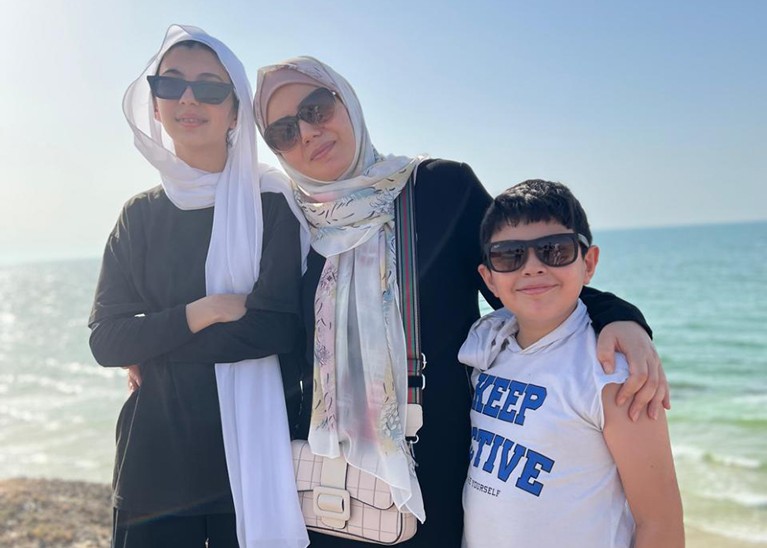
Amani Ahmed, who has settled in Edinburgh, UK, says her children still panic at the sound of fireworks, because it reminds them of the bombings in their homeland of Gaza.Credit: Salah Ahmed
Since Russia invaded Ukraine in February 2022, the UK government has spent close to £13 million (US$16 million) on fellowships to support around 180 Ukrainian academics at UK universities.
Those fellowships are organized with the assistance of the Council for At-Risk Academics (CARA), a non-governmental organization in London that supports academics facing threats or danger, and the British Academy, the country’s national academy for social sciences and the humanities.
Between them, they have placed engineers, medical researchers, scientists and social scientists in laboratories around the country.
In the wake of wars in the Palestinian territories (before an Israel–Hamas ceasefire announced last week), Lebanon (before an Israel–Hezbollah ceasefire took effect in November 2024) and Sudan, CARA is now receiving more requests of help from Middle Eastern researchers than from those in Ukraine.
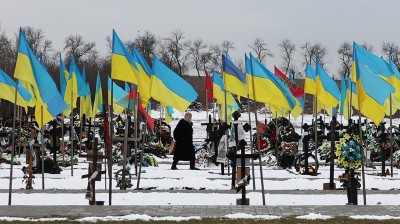
Ukrainian science: war’s impact
Before last week’s ceasefire announcement, the organization was processing around 130 applications from the Palestinian territories alone. “That’s the highest of any nationality this year,” says Zeid Al-Bayaty, deputy director and fellowship programme manager at CARA.
Hosting Ukrainian academics has proved to be an invaluable learning experience that makes UK universities and CARA more prepared to offer refuge to academics in need.
Trauma
Table of Contents
Amani Ahmed’s is just one example of the type of family that CARA is now supporting.
Ahmed is originally from Gaza and moved to the United Kingdom in 2022 to pursue a PhD in management studies at the University of Edinburgh, leaving her husband and three children behind.
She returned to the Scottish capital after a family visit just days before Hamas launched attacks on an Israeli music festival in October 2023, prompting the invasion of Gaza. CARA helped to reunite her with her family in Edinburgh in April 2024.
Ahmed says that the months of separation were unbearable. “I thought it would be better to go back to Gaza and be with the children, but the borders closed,” she says. “Often the Internet signal was down, but I would check my mobile every hour during the night hoping that I would hear something from them.”
Her husband and children eventually managed to cross into Egypt, where they were all reunited before travelling on to the United Kingdom together. The following month, their fourth child was born.
Living in a safe and peaceful city is a huge relief for Ahmed’s family. But they continue to feel the consequences of war.
“One of my daughters had a dream to study medicine and was always top of her classes. But since moving to a new country and school, she is not achieving the same academic level, so this is another trauma from the war,” says Ahmed. “My children still panic when hearing fireworks as, although they are meant to bring joy, all my children can think about is the sound of bombings from Gaza.”
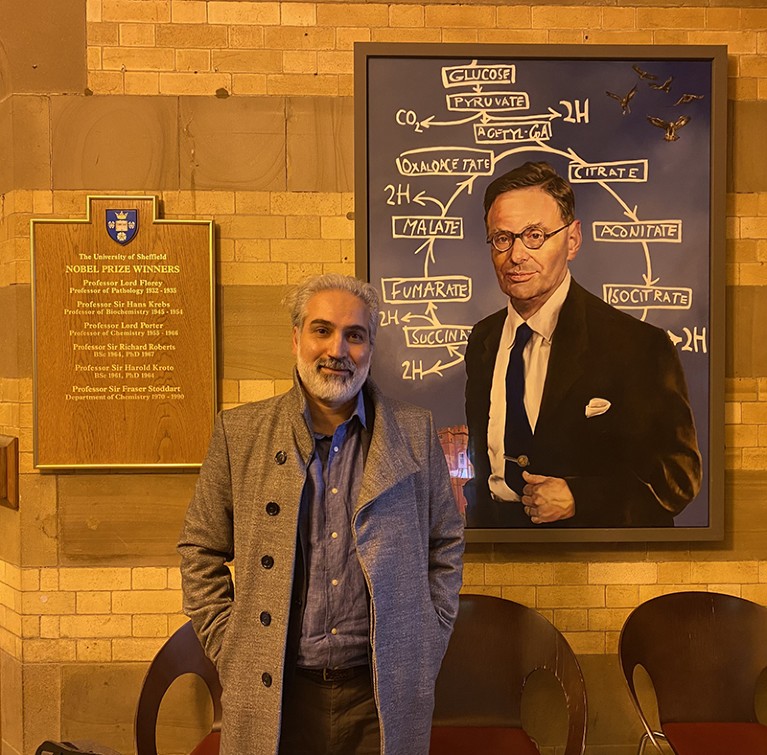
Zeid Al-Bayaty is deputy director and fellowship programme manager at CARA, which supports academics facing threats or danger.Credit: Zeid Al-Bayaty
Housing
Al-Bayaty says that lessons learnt from helping Ukrainian scholars can help the organization to support scholars such as Ahmed, and her family. But doing so requires the resources and mechanisms to bring them to the United Kingdom, and to make sure that universities know what they’re signing up for.
When CARA places a researcher at a host university, it makes sure that the academic responsibilities are clear. “We share hosting guidelines that outline expectations,” says Al-Bayaty. “Alongside academic mentors, they should have a non-academic mentor for pastoral support for practical stuff.”
The non-academic side of things, such as finding a school for children or a job for a spouse, is often the most difficult challenge for a new arrival to navigate. “The hardest part was finding a flat to rent,” remembers Valeriy Khokhlov, a meteorologist and climatologist who was placed at the University of Stirling after leaving Odesa, a city on Ukraine’s Black Sea coast, in 2022. For the first six months of his time in Stirling, he lived in university accommodation, because it was hard to find a more permanent home.
“Demand for housing is so high, and if you’re a landlord choosing between a tenant with a credit history versus someone who arrived a couple of weeks ago on a temporary placement, it’s easy to see who they might pick,” Al-Bayaty explains.
This challenge of finding a new home for someone fleeing war follows what is probably the most arduous journey of their life. For Tetyana Lunyova — a social scientist from Poltava, which is just a 2.5-hour drive from Ukraine’s frontier with Russia — this involved travelling with her then 10-year-old son westwards for more than 1,000 kilometres to reach the Hungarian border. “It was a long journey from Poltava to the west of Ukraine on an evacuation train and then taking a smaller bus,” she remembers.
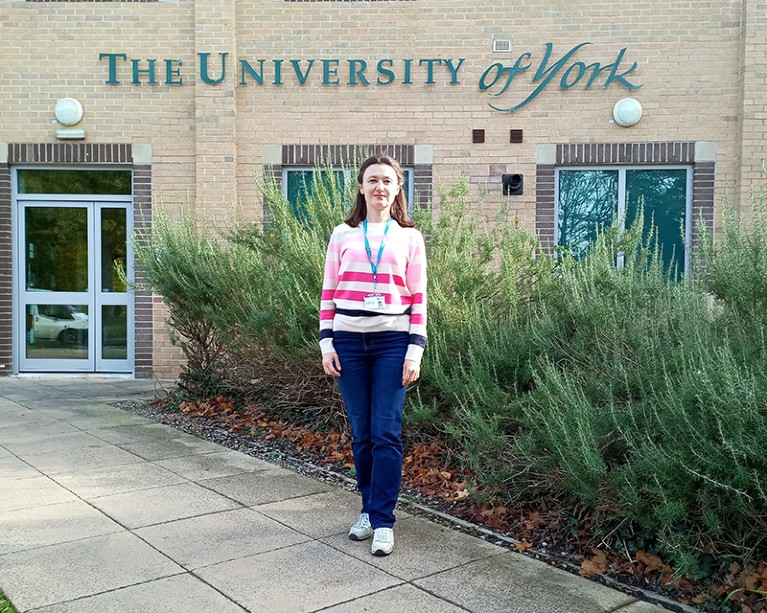
Tetyana Lunyova had to travel more than 1,000 kilometres across Ukraine to reach the Hungarian border, before continuing her journey to the United Kingdom.Credit: Mykhailo Lunyov
Throughout the journey, Lunyova was preoccupied by fears that she’d either run out of drinking water or lose her son at some point. She tried to get her son to memorize her phone number and she explained that if they were to be separated and he couldn’t reach her, he should try to get in touch with someone in academic circles.
“I’m not saying that everyone knows me in my field, but I’m published, and I thought he’d be able to trace me and find me that way,” she says. “I was trying to tell him all this without making him too stressed.”
Uncertainty
Al-Bayaty advises institutions looking to host an academic to start looking for appropriate accommodation options before they’ve even arrived in the country. He urges them to contact potential landlords to discuss the situation, and to assess how open they are to the idea of renting to a tenant with little history in the United Kingdom, and also emphasizing that the person arriving has a stipend, funding and employment.
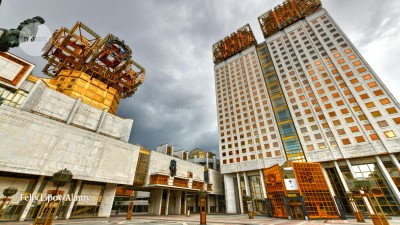
The future of research collaborations involving Russia
Lunyova remembers the uncertainty she felt when she arrived in the United Kingdom in 2022. She was placed in the department of education at the University of York after seeking help from Paul Roberts (now retired, but then director of the Centre for English Language Teaching at the university), who collaborated with Lunyova before the war.
